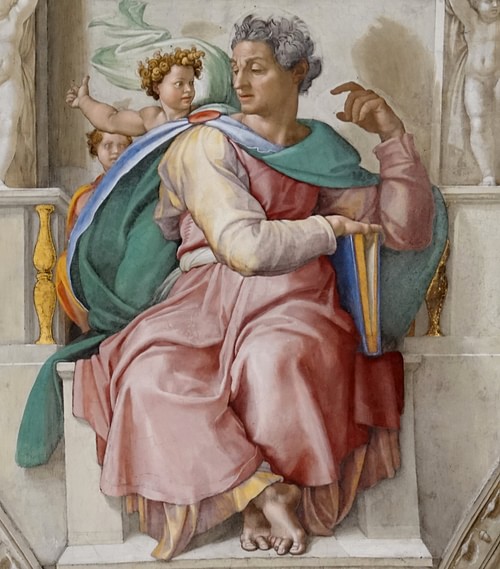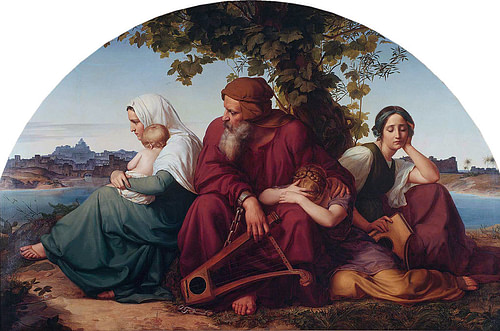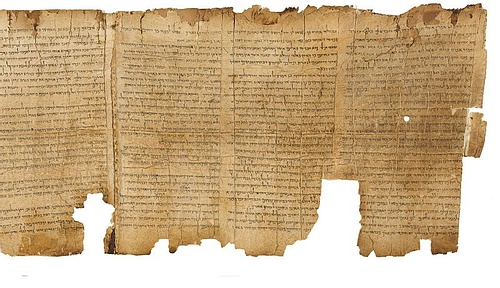
Isaiah was one of the major prophets of ancient Israel. Isaiah is Hebrew for "God is salvation." Isaiah is one of the longest prophetic books (66 chapters). Originating in the 8th century BCE, it was updated at least twice, in the 7th and 6th centuries BCE (the Babylonian and Persian periods) and perhaps the Hellenistic period (4th to 1st centuries BCE). Scholars sometimes referred to the sections as Proto-Isaiah (Chapters 1-39), Deutero-Isaiah (40-55), and Trito-Isaiah (56-66).
Prophets
Prophets were the Jewish version of oracles in the ancient world. It was a term for a person as well as a place. Categorized as divination, this was the way humans communicated with their gods. The oracle was possessed by the deity and served as a vehicle for the words. Sometimes the deity appeared in a vision. At other times, the prophet could experience an out-of-body journey to heaven and receive information from God or his angels.
In 722 BCE, the Assyrian Empire conquered and destroyed the Northern Kingdom of Israel. This is when ten of the twelve tribes of Israel were lost to history. In 587 BCE, the Babylonian Empire conquered and destroyed the Southern Kingdom of Judah and Solomon's Temple in Jerusalem. The prophets of Israel explained both disasters by claiming that the sins of the Israelites (specifically their idolatry) led God to punish them. However, they also offered a message of hope: sometime in the future, God would intervene once more in the final days (eschaton in Greek). At that time, he would restore Israel to its former glory and rectify all injustice.
The prophets related their visions and experiences as secrets that were revealed to them (apocalypsos in Greek). Criticism of the dominant ruling powers was often construed as treason, and so their literature utilized allegory and symbolism. Modern scholars refer to such texts as apocalyptic eschatology, the study of secrets revealed concerning the final days. The Book of Isaiah displays the elements of apocalyptic eschatology in both his visions and predictions for the nation of Israel.
Book of Isaiah
Isaiah opens with an oracle from God against the people during the Assyrian crisis:
Hear me, you heavens! Listen, earth! For the Lord has spoken: "I reared children and brought them up, but they have rebelled against me". ... "The multitude of your sacrifices—what are they to me?" says the Lord. "... I have no pleasure in the blood of bulls and lambs and goats ... Your New Moon feasts and your appointed festivals I hate with all my being. They have become a burden to me" (1:1-14).
This passage has often been interpreted as a condemnation of Judaism per se, particularly for the details of the cult of the Temple in Jerusalem. However, the dominant theme of Isaiah is repentance (or turning, as in turning back to God) by eliminating the elements of idolatry that had become a part of Israelite worship according to the prophets. At no time did Isaiah demand that the traditional sacrifices and rituals be eliminated, but sacrifices without repentance and purity of heart meant nothing.
After the Assyrians had conquered and reduced the Northern Kingdom of Israel, King Sennacherib (701 BCE) sent an army to subdue the Southern Kingdom of Judah. Isaiah encouraged King Hezekiah to resist. According to 2 Kings 19, an angel of God fell on the Assyrian army, and 185,000 soldiers were slaughtered. Judah was ultimately conquered and destroyed by the next rising power in the region, the Neo-Babylonian Empire. The Babylonians took the Jewish priests, scribes, and aristocrats to their capital city, Babylon. This period was known as the period of the Babylonian exile.

When Cyrus the Great conquered Babylonia and created the Persian Empire, he permitted the Jews of Babylon to return to Jerusalem and rebuild the city and the Temple. In this sense, Isaiah referred to Cyrus as "the messiah" ("anointed one") for his role in the prophesized restoration of Israel.
Themes in Isaiah
Like the other Prophetic books, Isaiah listed all the sins of the Israelites and their neglect of God's commandments in social justice. However, he also condemned all the leaders and kings of the other nations for their corruption. He included oracles against each of the neighboring empires of Israel.
Isaiah contains the same message of future hope found in the other prophetic books. On the day of Yahweh, the tribes would be gathered and brought back to Zion. Currently condemned, nevertheless, Isaiah has a message of hope for the nations:
It is too small a thing for you to be my servant to restore the tribes of Jacob and bring back those of Israel I have kept. I will also make you a light for the Gentiles, that my salvation may reach to the ends of the earth. (Isaiah 49:6)
Chosen at Mount Sinai, Israel was to be model that would lead all the nations to conform to the God of Israel:
[Kings will bring your sons in their arms and carry your daughters on their hips. ... They will bow down before you with their faces to the ground; they will lick the dust at your feet. Then you will know that I am the Lord; those who hope in me will not be disappointed. (Isaiah 49:22-23)
The message is that God would not only restore Israel but also the original plan of the Garden of Eden before the fall. This will be a utopian existence where "The wolf will live with the lamb, the leopard will lie down with the goat, the calf and the lion and the yearling a together; and a little child will lead them" (Isaiah 11:6). God "will judge between the nations and will settle disputes for many peoples. They will beat their swords into plowshares and their spears into pruning hooks. Nation will not take up sword against nation, nor will they train for war anymore" (Isaiah 2:4).

Isaiah in Second Temple Judaism (515-70 CE)
Isaiah became one of the most popular books in the Second Temple period, updated to respond to the oppression of the Greek occupation and the Maccabean Revolt (167 BCE) and then the conquest of Jerusalem by Rome in 63 BCE. The hope for the restoration of Israel in the apocalyptic literature, consistently referenced Isaiah in texts such the Book of Daniel, portions of Ezekiel, Similitudes of Enoch, 2 Baruch, 4 Ezra, and the third of the Sibylline Oracles. Various sects of Jews in this period all utilized Isaiah to validate their interpretations of the volatile times.
Isaiah in Christianity
The emerging sect of Jews who laid the foundations for Christianity relied almost exclusively on Isaiah to articulate and validate their claims concerning Jesus of Nazareth. Isaiah was quoted 85 times in the New Testament:
Matthew's application of Isaiah 7:14 – "Therefore the Lord himself will give you a sign: The virgin will conceive and give birth to a son, and will call him Immanuel, ["God is with us"] – became the Christian conviction that God himself was manifest on earth in Jesus. As later incorporated into George Frideric Handel's oratorio Messiah:
"For to us a child is born, to us a son is given, and the government will be on his shoulders. And he will be called Wonderful Counselor, Mighty God, Everlasting Father, Prince of Peace." (Isaiah 9:6)
Luke has Jesus begin his ministry in a synagogue where he reads from the scroll of Isaiah:
The Spirit of the Lord is on me, because he has anointed me to proclaim good news to the poor. He has sent me to proclaim freedom for the prisoners and recovery of sight for the blind, to set the oppressed free, to proclaim the year of the Lord's favor. (Luke 4:18-19)
The Trial and Crucifixion of Jesus of Nazareth
One of the earliest problems for those who claimed that Jesus was the messiah, was the fact that he died by crucifixion; a dead messiah offered little hope. An early (unidentified) Christian claimed that the death of the Messiah was prophesized by Isaiah. Chapters 45-53 of Isaiah became known as the suffering servant passages. Isaiah narrated a devoted believer in the God of Israel, who suffered, was tortured and then killed. God then 'raised him up' (resurrection) and placed him on the throne of God. In the historical context of Isaiah, the suffering servant was the nation of Israel. By the time Mark wrote his gospel (69/70 CE) details of the suffering servant were interpreted as the fulfillment of Scripture (meaning the Prophets). In the gospels, Mark's description of the crucifixion of Jesus incorporated many of the suffering servant passages: he went "like a lamb to the slaughter " (Isaiah 53"7) and "He was pierced for our transgressions" (Isaiah 53:5).
Polemic Against Unbelieving Jews
By the time the gospels were written (70-100 CE), there were more Gentiles (non-Jews) who became members of this new community. The gospels had to explain why the mission of Jesus had failed among the Jews. They consistently utilized Isaiah's castigation against the Israelites as a prediction that there would only be a righteous remnant of true believers (now the Christians) and that God had turned away from the Jews:
He said, "Go and tell this people: 'Be ever hearing, but never understanding; be ever seeing, but never perceiving.' Make the heart of this people calloused; make their ears dull and close their eyes." (Isaiah 6:9-10)
This passage was utilized in the story of the disciples asking why Jesus taught in parables. Jesus answered: "This is why I speak to them in parables: 'Though seeing, they do not see; though hearing, they do not hear or understand. In them is fulfilled the prophecy of Isaiah...'" (Matthew 13:13-14). In other words, this passage claimed that God himself had determined that most Jews would not be saved, because their hearts were hardened.

Inclusion of the Gentiles
Isaiah's predictions of the coming kingdom of God were used throughout the New Testament to validate the inclusion of Gentiles. When Simeon the Prophet encountered the baby Jesus in the Temple, he praised God, saying:
Sovereign Lord, as you have promised, you may now dismiss your servant in peace. For my eyes have seen your salvation, which you have prepared in the sight of all nations: a light for revelation to the Gentiles, and the glory of your people Israel. (Luke 2:29-32)
The Parousia
The prophetic predictions of the final days, particularly the defeat of the enemies of Israel, did not happen during Jesus' time on earth. To counter this problem, an unknown early Christian conceived of the concept known as the parousia, or second appearance. Jesus, now in heaven, would return to earth at a future date, and then all the elements for the establishment of God's kingdom would be manifest.
This concept was dominant in the letters of Paul the Apostle to the Gentiles. His favorite Prophet appeared to be Isaiah (quoted 27 times), whom he used to describe what the kingdom would be like when Jesus returned. He utilized Isaiah to teach his communities how to live proleptically as if the kingdom were already here: "See, I will create new heavens and a new earth. The former things will not be remembered, nor will they come to mind" (Isaiah 65:17).
John of Patmos' Book of Revelation, relies heavily upon the prophetic predictions of the final days. However, through his use of allegory and symbols, debate continues concerning the literal use of Isaiah. There are 72 allusions to Isaiah, of which perhaps 40 are direct citations.
Legends of Isaiah
A combined Judeo-Christian text, Ascension of Isaiah, emerged between the 1st and the 3rd century CE. Enhancing the evil deeds of King Manasseh who undid all of Hezekiah's reforms (2 Kings 21), this pseudepigraphical text details the martyrdom of Isaiah. A false prophet, Belkira, accused Isaiah of treason. Manasseh condemned him to death. Isaiah magically hid in a tree, but he was found. Manasseh sawed the tree in half, and Isaiah's blood spurted out.
The later Jewish Babylonian Talmud and the Jerusalem Talmud may have utilized this earlier text for their claim that Isaiah was sawed in half. This story is also related in the Quran. In the Muslim version, however, it was the Israelites who sawed Isaiah in half and not Manasseh.
The language and poetry of Isaiah's oracles are incredibly rich in spirituality. Modern Christians continue to utilize his work by incorporating many of the passages as lyrics to hymns. Both the Western Catholic Churches and Eastern Orthodox Churches utilize Isaiah 6:5 (known as the Sanctus) in the liturgy: "Holy, holy, holy is the Lord Almighty; the whole earth is full of his glory." Eastern Orthodox Churches celebrate him as a saint on 9 May. On the same date, he is honored as a saint and martyr in the Roman Catholic Church.








